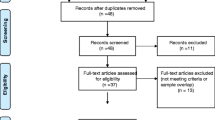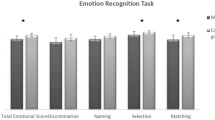Abstract
The objective of this study is to evaluate the relationship between social cognition (SC) and cognitive impairment in persons with multiple sclerosis (PwMS). A prospective study was conducted in 60 PwMS, 30 with relapsing-remitting MS (RRMS), 15 with secondary progressive MS (SPMS) and 15 with primary progressive MS (PPMS), and in healthy subjects (HS). All subjects were assessed by the Bordeaux Social Cognition Evaluation Protocol (PECS-B) (facial emotion recognition, theory of mind, emotional awareness and cognitive and affective alexithymia), by a large neuropsychological battery and by questionnaires (depression and anxiety). 43.3% of PwMS were impaired for at least one SC test. The proportion of PwMS with at least two impaired SC tests was similar in all three phenotypes (20%). Mean scores differed significantly between PwMS and HS only for the Reading the Mind in the Eyes Test, a test of Theory of Mind (ToM). ANOVA analyses showed an effect of phenotype on emotional awareness scores with lower scores in PPMS as compared to RRMS. ToM performance was significantly correlated (r 2 = 0.56) with executive functions, working memory and episodic memory scores. SC impairment was found in all phenotypes and was more prominent in cognitively impaired MS patients. Executive functions, and working and episodic memory performance accounts for approximately 50% of ToM performance. Emotional awareness is more impaired in progressive MS.


Similar content being viewed by others
References
Dulau C (2015) Introduction to social cognition. In: Brochet B (ed) Neuropsychiatric symptoms of inflammatory demyelinating diseases. Springer, Cham, pp 181–194
Frith C, Frith U (2005) Theory of mind. Curr Biol 15:R644–R645
Green MF, Penn DL, Bentall R et al (2008) Social cognition in schizophrenia: an NIMH workshop on definitions, assessment, and research opportunities. Schizophr Bull 34:1211–1220
Dulau C (2015) Social cognition and multiple sclerosis. In: Brochet B (ed) Neuropsychiatric symptoms of inflammatory demyelinating diseases. Springer, Cham, pp 213–226
Bora E, Özakbaş S, Velakoulis D, Walterfang M (2016) Social cognition in multiple sclerosis: a meta-analysis. Neuropsychol Rev 26:160–172
Cotter J, Firth J, Enzinger C et al (2016) Social cognition in multiple sclerosis: a systematic review and meta-analysis. Neurology 87:1727–1736
Polman CH, Reingold SC, Banwell B et al (2011) Diagnostic criteria for multiple sclerosis: 2010 revisions to the McDonald criteria. Ann Neurol 69:292–302
Etchepare A, Merceron K, Amieva H et al (2014) Évaluer la cognition sociale chez l’adulte: validation préliminaire du Protocole d’Evaluation de la Cognition Sociale de Bordeaux (PECS-B). Rev Neuropsychol 6:138–149
Stone VE, Baron-Cohen S, Knight RT (1998) Frontal lobe contributions to theory of mind. J Cogn Neurosci 10:640–656
Brunet E, Sarfati Y, Hardy-Baylé MC (2003) Reasoning about physical causality and other’s intentions in schizophrenia. Cognit Neuropsychiatry 8:129–139
Baron-Cohen S, Wheelwright S, Hill J et al (2001) The “Reading the Mind in the Eyes” test revised version: a study with normal adults, and adults with Asperger syndrome or high-functioning autism. J Child Psychol Psychiatry 42:241–251
Baron-Cohen S, Wheelwright S, Jolliffe T (1997) Is there a “language of the eyes”? Evidence from normal adults, and adults with autism or Asperger syndrome. Vis Cogn 4:311–331
Lane RD, Quinlan DM, Schwartz GE et al (1990) The Levels of Emotional Awareness Scale: a cognitive-developmental measure of emotion. J Pers Assess 55:124–134
Vorst HCM, Bermond B (2001) Validity and reliability of the Bermond–Vorst Alexithymia Questionnaire. Pers Individ Diff 30:413–434
Amieva H, Carcaillon L, Rouze L’Alzit-Schuermans PR et al (2007) Cued and uncued memory tests: norms in elderly adults from the 3 Cities epidemiological study. Rev Neurol (Paris) 163:205–221
Wechsler D (1997) Wechsler Adult Intelligence Scale-III, administration and scoring manual. The Psychological Corporation, San Antonio
Rao SM and the Cognitive Function Study Group of the National Multiple Sclerosis Society (1990) A manual for the Brief Repeatable Battery of Neuropsychological Tests in multiple sclerosis. National Multiple Sclerosis Society, Milwaukee
Ruet A, Deloire MS, Charre-Morin J et al (2013) A new computerised cognitive test for the detection of information processing speed impairment in multiple sclerosis. Mult Scler 19:1665–1672
Anonymous (2005) The D2 Test of Attention: an examination of age, gender, and cross-cultural indices. Argosy University
Golden CJ (1975) A group version of the Stroop color and word test. J Pers Assess 39:386–388
Godefroy O, Azouvi P, Robert P et al (2010) Dysexecutive syndrome: diagnostic criteria and validation study. Ann Neurol 68:855–864
Vayalakara J, Devaraju-Backhaus S, Bradley J et al (2000) Abbreviated form of the Wisconsin card sort test. Int J Neurosci 103:131–137
Beck AT, Brown G, Steer RA (1996) Beck depression Inventory II manual. The Psychological Corporation, San Antonio
Spielberger CD (1983) Manual for the State-Trait Anxiety Inventory. Consulting Psychologists Press, Palo Alto
Henry A, Tourbah A, Chaunu MP et al (2011) Social cognition impairments in relapsing-remitting multiple sclerosis. J Int Neuropsychol Soc 17:1122–1131
Kraemer M, Herold M, Uekermann J et al (2012) Theory of mind and empathy in patients at an early stage of relapsing remitting multiple sclerosis. Clin Neurol Neurosurg 115:1016–1022
Henry JD, Phillips LH, Beatty WW et al (2009) Evidence for deficits in facial affect recognition and theory of mind in multiple sclerosis. J Int Neuropsychol Soc 15:277–285
Banati M, Sandor J, Mike A et al (2010) Social cognition and theory of mind in patients with relapsing-remitting multiple sclerosis. Eur J Neurol 17:426–433
Ouellet J, Scherzer PB, Rouleau I et al (2010) Assessment of social cognition in patients with multiple sclerosis. J Int Neuropsychol Soc 16:287–296
Roca M, Manes F, Gleichgerrcht E et al (2014) Cognitive but not affective theory of mind deficits in mild relapsing-remitting multiple sclerosis. Cogn Behav Neurol 27:25–30
Pottgen J, Dziobek I, Reh S et al (2013) Impaired social cognition in multiple sclerosis. J Neurol Neurosurg Psychiatry 84:523–528
Genova HM, Cagna CJ, Chiaravalloti ND, DeLuca J, Lengenfelder J (2016) Dynamic assessment of social cognition in individuals with multiple sclerosis: a pilot study. J Int Neuropsychol Soc 22:83–88
Beatty WW, Goodkin DE, Weir WS et al (1989) Affective judgments by patients with Parkinson’s disease or chronic progressive multiple sclerosis. Bull Psychon Soc 27:361–364
Berneiser J, Wendt J, Grothe M et al (2014) Impaired recognition of emotional facial expressions in patients with multiple sclerosis. Mult Scler Relat Disord 3:482–488
Phillips LH, Henry JD, Scott C et al (2011) Specific impairments of emotion perception in multiple sclerosis. Neuropsychology 25:131–136
Prochnow D, Donell J, Schäfer R et al (2011) Alexithymia and impaired facial affect recognition in multiple sclerosis. J Neurol 258:1683–1688
Chahraoui K, Duchene C, Rollot F et al (2014) Longitudinal study of alexithymia and multiple sclerosis. Brain Behav 4:75–82
Gay M-C, Vrignaud P, Garitte C et al (2010) Predictors of depression in multiple sclerosis patients. Acta Neurol Scand 121:161–170
Charvet LE, Cleary RE, Vazquez K, Belman AL, Krupp LB, US Networkfor Pediatric MS (2014) Social cognition in pediatric-onset multiple sclerosis (MS). Mult Scler 20:1478–1484
Aboulafia-Brakha T, Christe B, Martory MD et al (2011) Theory of mind tasks and executive functions: a systematic review of group studies in neurology. J Neuropsychol 5:39–55
Acknowledgements
Our research group is part of TRAIL, cluster of excellence (ANR-10-LABX-57). This project was supported by a grant from Ligue Française de la Sclérose en Plaques.
Conflicts of interest
The authors did not report disclosures relevant to the present publication. Pr Brochet or its institution received research grants and/or consulting fees from Biogen, Bayer-Healthcare, Novartis, Genzyme, Roche, Medday, Merck-Serono, Actelion and Teva. C Dulau received a travel grant from Teva. M Deloire, H Diaz, A Saubusse, J Charre-Morin, and A Prouteau have nothing to disclose.
Ethical standards
The study was conducted at the MS clinic of the Bordeaux University Hospital between March 2013 and June 2014 according to the declaration of Helsinki. Bordeaux ethical committee (Comité de protection des personnes) has approved the use of human subjects for this study.
Informed consent
All patients and subjects gave informed written consent.
Author information
Authors and Affiliations
Corresponding author
Additional information
A. Prouteau and B. Brochet share co-seniorship of this study.
Rights and permissions
About this article
Cite this article
Dulau, C., Deloire, M., Diaz, H. et al. Social cognition according to cognitive impairment in different clinical phenotypes of multiple sclerosis. J Neurol 264, 740–748 (2017). https://doi.org/10.1007/s00415-017-8417-z
Received:
Revised:
Accepted:
Published:
Issue Date:
DOI: https://doi.org/10.1007/s00415-017-8417-z




